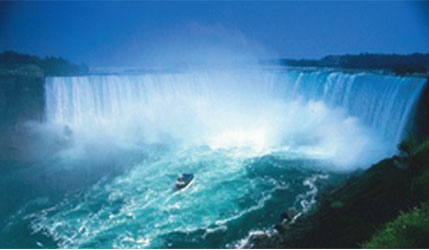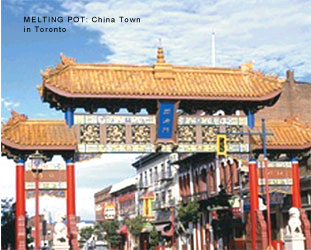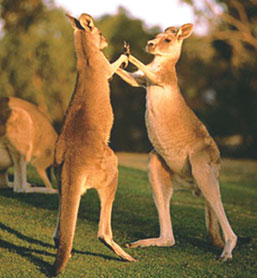| |
|
|
DOLLAR DREAMS
Donít be green with envy when your NRI cousin flashes those
greenbacks. Join him abroad and get a slice of the good life
By Rakesh K. Sinha

MISTY LAND: Horseshoe Falls in Ontario
|
|
Despite a booming
national economy, Indians are heading West, East and everywhere in between in
ever larger numbers. They-like any other people-migrate for a slew of reasons.
Many believe they wonít make it in their job or business, while some want to
chuck the bureaucracy and the bribe-for- everything-under the-sun culture, and
breathe easier abroad. Others are saddled with an ogre of a boss they canít get
rid off. And then there are those who are doing just fine but want to
get rich quick and have realized that the only honest way to make
megabucks honestly is by going
|
Many go through agents, others get job offers, while some incredibly lucky bastards are yanked out of India by their relatives living the dream
abroad. INDIA EMPIREíS quick guide takes you through the process of migration to various
popular destinations. This month, weíll focus on all-time favorite Canada, and the antipodes Australia and New Zealand.
CANADA
Itís said that the Canadians are so polite, they say thank you to their ATMs. Itís one of the few Western countries that donít reek
of xenophobia or racism. Outside of the Scandinavian countries, Canada offers perhaps the best living conditions and social security in the world.
Says Anuj Chopra, a senior official with CWIC, a leading Chandigarh-based immigration agent: "For anybody wanting to spice up the quality of their life,
thereís no place like Canada. One should explore the tremendous possibilities
there."
|
|
 MELTING POT: China Town in Toronta
MELTING POT: China Town in Toronta
|
Itís a huge country, over five times the
size of India, and has a comparatively small population, which means that itíll
be a long, long time in the future that the country will be overpopulated.
Perhaps thatís one reason the natives arenít afraid of being swamped by waves of
immigrants from developing countries such as India.
And unlike other countries that keep raising the bar for the tired and the poor from the rest of
the world, Canada has actually lowered it. Provinces in the country have come to the
conclusion that to keep their economy humming, young immigrants that work like ants are a
must.
To become a Canadian permanent resident, a foreign individual must apply for and be issued a
Canadian permanent resident visa. One way to qualify for Canadian permanent resident status is as
an economic immigrant. Economic Immigrants are divided into two main categories: skilled
workers / professionals; and investors, entrepreneurs and self-employed persons
(collectively referred to as business immigrants).
Weíll focus on the skilled worker/professional applicants (other than those destined for Montreal or another city in the French speaking state of
Quebec), as most hopefuls-or do we say desperate ones-from India fall under this category. Skilled workers are assessed based upon a series of factors which are designed to indicate the likelihood of becoming economically established in Canada. Each factor is allotted a maximum number of
points and applicants must attain at least 67 points in order to qualify for a Canadian immigrant visa.
Canadian permanent residents are entitled to live and work anywhere in Canada, may apply for Canadian citizenship after three years and may sponsor family members. Indians have seen surefire success. Entire villages in Punjab have been emptied of people because of this policy.
Your spouse and any dependent children may be included in the application. Children must be under the age of 19 years. If they are 19 and
older, they must not have had an interruption of more than 12 months in their schooling.
Accompanying dependents will be subject to medical and security clearance requirements. Other family members, such as parents, generally cannot be included in the application but you can sponsor them as part of the family class after you arrive in Canada.
Make sure you fit the bill. "Only a hardworking person should think of migrating to Canada. Thereís no place for slackers in the West," says
Chopra.
If you donít have a job offer, it could take anywhere between 24 and 36 months before you get the green light. Chances of qualifying are best if you are in the 21-49 age group. For more information please log on to the government of Canadaís immigration website, www.india.gc.ca. The
embassy phone number in New Delhi is 51782000.
The visa fee to be submitted by the principal applicant in the skilled worker category is CAD $550.
| Points required for canada |
67 |
| Factors |
Points |
Education
-
PhD, or Master's, and at least 17 years of full-time
or full-time equivalent
study
-
A two-year university degree at the Bachelor's level
and at least 14 years
of full-time or full-time equivalent
study
-
A three-year diploma, trade certificate or
apprenticeship
and at least 15 years of full-time or
full-time equivalent study
-
A two-year diploma, trade certificate or
apprenticeship
and at least 14 years of full-time or
full-time equivalent study.
-
English and French language ability
You
can gain up to 16 points for one official language
and up to 8 points if you know another.
|
25
20
22
20
|
|
Work
experience
|
8
10
8
6
4
2 |
|
Age
|
8
10
8
6
4
2 |
|
Arranged
employment
|
-- |
|
Adaptability
-
You can receive a
maximum of 10 points based on any combination of the elements listed
below
Your spouse has
-
Completed a three-year
university degree and has at least 15 years of education 4
-
Completed a Master's
or Ph.D. and has at least 17 years of education 5
-
You or your
accompanying spouse has completed a post-secondary program of at
least two years in Canada since the age of 17 5
-
You or your
accompanying spouse has worked in Canada
-
Worked full-time in
Canada for at least one year 5
-
You or your
accompanying spouse or common-law partner has family in Canada.
|
4
5
5
5
5
|
|

UNTAMED: Polar bears in Manitoba
|
|
AUSTRALIA
For those who feel there are too many Indians in Canada, Australia is a good
option. Though the Aussies donít give many social security benefits, preferring the American style survival-of-the-fittest social
contract, Indians havenít had too many problems fitting in. Besides, Australians are a laid back people, which is perhaps why
Australia is one of the few countries in the world that doesnít suffer from the Monday morning blues.
Go for the good life by all means, but get a heavy dose of reality before you do
so.
|
According to an immigration official,
the "give me your tired, your poor" days are almost over. Canberra is increasingly looking at immigrants from Europe.
(which explains the plethora of Greek restaurants) and the wellheeled . But hey ,don ít lose heart .Says the official , " Just doní t have too many expectations and you íll be fine . "
For general skilled migration to Australia , you and your spouse must be under 45 years of age when you apply .You must have sufficient ability in the English language and have post - secondary (such a suniversity or trade) qualifications .When you apply , you must nominate a skilled occupation that fits your skills and qualifications . Your nominated occupation must be on the skilled
occupationlist (SOL ) .For m re information about the SOL , please read for m 1121i available free fro m the Department of Immigration and Multicul tural and Indigenous Affairs
(DIMIA)
website www.immi.gov.au. If your nominated occupation is not on the SOL you cannot
apply.
|
Before you apply, you and/or your spouse must have your skills assessed by the
relevant assessing authority for your nominated occupation. For instance, if you are a dentist, you will be assessed by the Australian Dental Council. If you are a public relations officer, you will be assessed by the Vocational Education and Training Assessment Services. For the record, a dentist gets 60 points, while the PRO gets only 50.
The assessment will determine if your skills are suitable for your nominated occupation. Your skills assessment must be included with your application.
You cannot lodge a valid application without including a skills assessment from
the relevant Australian authority. Just keep in mind that these bodies only assess,
|
|
 AUSSIE SIGHT: Your friendly
neighbour hood kangaroos
AUSSIE SIGHT: Your friendly
neighbour hood kangaroos
|
for a fee,whether your educational
qualifications and work experience are valid and relevant in Australia. So
please donít badger them for jobs. As it is, Westerners visiting our country
walk sideways when they see an Indian approaching because he thinks the Indian
will ask him for a job in his country.
| Points required for
Canada |
120 |
| Factors |
Points |
Skills
-
For most occupations where training is specific to the
occupation
-
For more general professional occupations
-
For other general skilled occupations.
|
60
50
40
|
|
Age
30 to 34 years
35 to 39 years
40 to 44 years
|
30
25
20
15
|
|
English language
ability
Resonable Command
|
15
10
|
|
Work
experience
For occupation in demand, with job offer
|
10
15
|
|
Education
Australian Masters or Honors degree
|
15
10
|
|
Spouse Skills
Capital investment in Australia (min. of A$100,000)
|
5
5
|
|

MUSIC TO THE EARS: The famous Opera House in Sydney adds a touch of class
|
|
Start saving now for the new life ahead. The cost of living in Australia can be high. It is estimated that in 1999, household of
immigrants who had lived in the country for less that two years spent an average of
A$ 930 a week
supporting three people. It is estimated that a couple renting accommodation in
Australia would need a minimum A$365 a week.
Donít expect any dole from Day 1. Newly arrived migrants have to live as permanent residents in
Australia for two years before they can get most social security payments,
including unemployment and sickness benefits. To be able to get age and
disability benefits, you have to live in the country for 10 years.
|
The visa fee to be submitted by the principal applicant in the skilled worker category is:
Ist Installment: A$ 1845 and
2 Installment: Spouse/child over 18 with less than functional English: A$2,630.
NEW
ZELAND
New Zealand is a young nation with great
potential. Itís a beautiful country and the locals are
proud of it.
When the first Maorióthe nativesócame
here they traveled across the vast Pacific Ocean in
giant ocean-going canoes. After a long voyage they
saw a line of white cloud in the sky. It showed that
finally there was land ahead of them. The Maori
named the new land Aotearoa ó Land of the Long
White Cloud. My relatives in Auckland tell me that
the country is so clean and pollution free that
people may walk a mile to their supermarket bare
feet and when they return, thereís not a speck of
dust on their feet. In India most homes arenít that
neat.
|
|
 KIWI DEMOCRACY: The New
Zealand
Parliament
in Wellington
KIWI DEMOCRACY: The New
Zealand
Parliament
in Wellington
|
But if that was the teaser, hereís the reality
check. New Zealand is a tough country to get into.
During the past four or five years that immigration
was open, there was such a huge influx of people,
the majority from, where else, India that the
nervous Kiwis thought in a few years they would be
a fully Asian country. The upshot: the bar has been
raised to an all-time high and promises to be set
higher in the future. Worse, the government has
brought out a list of around 16 countries whose
labor standards it recognizes, and surprise, India is
not in it. Of course, if you are a crack IT pro,
chances are youíll be a shoo-in.
The New Zealand
government policy
permits the granting of
permanent residence
up to 45,000 persons
per year under a range
of visa classes, allowing
both permanent and
temporary residence.
However it is estimated
that up to twice this
number apply for
immigration to New
Zealand every year.
Applicants must
satisfy a minimum level
of English language
ability and those
persons in regulated
occupations (i.e.
nurses, accountants,
lawyers etc) must be
registered with the
relevant regulatory
body before applying.
No points are awarded
for job offers that are
not relevant to your
qualifications or
experience.
After the
introduction of the
proposed new
immigration legislation
for the skilled migrant
categoryin late
2003/early 2004, all applicants for this visa class
will need to meet a minimum qualifying mark
before an expression of interest can be registered
with the New Zealand Immigration Service. The
minimum qualifying mark will be a points-based
system and points will be awarded based on
character, health, English language ability and
employability.
If applicants are successful at this stage they
will then be passed into the 'Skilled Migrant Pool,'
where they will be ranked according to the points
scored. Starting at the top of the list, prospective
migrants will be invited to apply for residence at
regular intervals in numbers sufficient to meet the
annual immigration program. Registrations will
lapse after a set period (approximately three
months) if no invitation to apply has been made.
Once applications are lodged the applicant will
be verified to ensure that they will be able to
successfully settle in, and contribute to, New
Zealand. If the applicant receives a positive
assessment they will be granted permanent
residence, if not they will only be granted a two-year
work to residence permit, followed by the option to
reapply for permanent residency.
Visa application fee: NZ$1,360
A few words of caution before you proceed.
When you begin your quest, start with the embassy or high commission of the country
you want to migrate to. Often, what seems like a
mountain of a task will look a lot simpler once
youíve talked to an immigration officer.
If you are too busy to stand in the queues at the
embassies, and wish to hire an agent, make sure
heís registered. If he says yes, ask him if he has a
license from Indiaís Labor Ministry. He should be
able to show it on demand.
Agents may charge anywhere between Rs
15,000 and Rs 1.5 lakh depending on the country
and the nature of visa. That kind of money will
come handy in your initial days in a foreign country.
A little sweat, a few days of running around, and
looking up government websites can save you a lot
of trouble. Afoot or afloat, itís worth the trip.
When you finally make it, please park all your
bad habits at home before you take off. Every Indian
abroad is his countryís representative. Put on you
best or else youíll make Indians as embarrassed as
the guy in the following story. An Indian and an
American where traveling in a car through the
United States.
The American said that when he visited India
he was shocked and disgusted by the large number
of Indians he saw peeing out in the open. The
Indian challenged that he would spot an American
doing such things in public too and started looking
out of the window in earnest. After about two hours,
he yelled, "Stop, stop, I see someone in the bushes
out there." The American couldnít believe his eyes.
They both walked towards the guy and the
American asked him who he was and what he was
up to.
The guy replied, "Iím the ambassador of
India, and leave me alone."
And finally just remember, your dreams kicked
off from these pages in INDIA EMPIRE.
| Points required for
Newzeland |
100 |
| Factors |
Points |
Education
-
Basic qualification (e.g. trade qualification, diploma,
bachelors' degree)
-
Post-graduate
qualification (e.g. Masters degree or higher)
|
50
55
|
|
Bonus
Points For
|
10
5
10
|
|
Age
30 to 39 years
40 to 44 years
45 to 49 years
50 to 55 years
|
30
25
20
10
5
|
Relevant
Work
experience
4 years
6 years
8 years
10 years
|
10
15
20
25
30
|
|
Bonus
points for work experience in New Zealand
4 years
6 years and more
|
5
10
15
|
|
Additional bonus points for work experience in an
identified future growth area, identified cluster or
area of absolute skills shortage
6 years or more
Current employment in NZ for 12 months or more (ongoing)
Offer of employment in New Zealand or current
employment in NZ for less than 12 months (but minimum of 3 months)
|
5
10
60
50
|
|
|